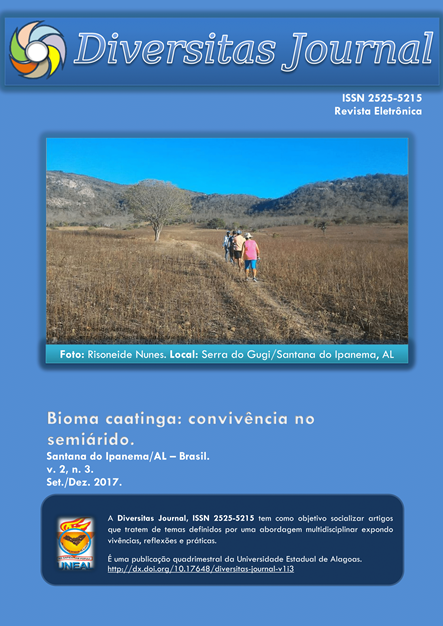Relações identitárias e a representação da infância em “As horas da minha alegria”
DOI:
https://doi.org/10.17648/diversitas-journal-v2i3.575Abstract
RESUMO: O estudo da representação da infância é analisado a partir de trechos da obra As horas da minha Alegria, sob a autoria de Izabel Brandão. Objetivou-se com este estudo de conceber-se aspectos que envolvem não só situações cotidianas vivenciadas pela autora da obra analisada, mas que se encontram cada vez mais suprimidos pela lógica da instantaneidade dos momentos na sociedade atual, embebida pela onda high tech. A metodologia adotada baseou-se na interpretação do conteúdo das narrativas do gênero textual poético elencando-se as relações identitárias de Brandão (2013 e 2014) como fontes bibliográficas. Este trabalho teve como fundamento de pesquisa a bibliográfica qualitativa interpretando os poemas que retratam memórias da sua infância. Aprofundou-se nas literaturas de Brandão (2013), Cunha (2013), Lameiras (s.d). Todos discutindo sobre a infância. Então iniciou-se a análise com Lameiras (2013) por descrever as transições de fronteiras históricas familiares. Para o desenvolvimento deste trabalho utilizou-se como subsídio os poemas: A casa da minha infância, Jasmins da Infância e Infância. Todos retratando vivências da autora e criticidade da sociedade atual. Os poemas de Izabel descrevem sua história, ideologia e desejos. Faz um enlaçamento de sua infância com a de seu filho Pedro atualmente, descrevendo que a sua infância quanto a de seus irmãos não serão como a de Pedro, deixando uma crítica a crianças que não tem mais o sabor da brincadeira de imitar animais no escuro. Enfim seus poemas além de ser autobiográficos se tornam autobiografia de outras pessoas também por serem tão vivo, ao lê-los nos identificamos.
PALAVRAS-CHAVE: Identidade. Infância. Literatura.
ABSTRACT: The study of the representation of childhood is analyzed from excerpts from the book The Hours of My Joy, written by Izabel Brandão with the objective of conceiving aspects that involve not only daily situations experienced by the author of the work analyzed, but which are increasingly suppressed by the logic of instantaneousness of moments in today's society embedded by the high tech wave. The methodology adopted was to interpret the content of the narratives of the poetic textual genre by listing the Brandão's (2013 and 2014) indemnity relations as bibliographic sources. This work will have as basis of research the qualitative bibliographical interpreting the poems that depict memories of his childhood. I explored the literatures of Brandão (2013), Cunha (2013), Lameiras (s.d). Everyone arguing about childhood. So I started the analysis with Lameiras (2013) for describing the transitions of familiar historical boundaries. For the development of this work I obtained as a subsidy the poems: The house of my childhood, Jasmins of Childhood and Childhood. All portraying the author's experiences and criticality of the current society. Izabel's poems describe her history, ideology and desires. He makes a bond between his childhood and that of his son Pedro today, describing that his childhood as that of his brothers will not be like that of Pedro, leaving a critique of children who no longer have the taste of the joke of imitating animals in the dark. In short, his poems, besides being autobiographical, become autobiographical of other people also because they are so alive, as we read we identify.
KEYWORDS: Identity. Childhood. Literature.
Metrics
References
BRANDÃO, Izabel de Fátima de Oliveira. As horas da minha Alegria. Maceió. Disponível em: <http://alagoasboreal.com.br/editoria/604/cultura/-as-horas-da-minha-alegria-e-o-terceiro-livro-de-poesia-de-izabel-brandao>. Acesso em: 12 dez. 2014.
BRANDÃO, Izabel de Fátima de Oliveira. As horas da minha Alegria. Florianópolis: Ed. Mulheres, 2013.
CUNHA, Helena Parente; BRANDÃO, Izabel de Fátima de Oliveira. Florianópolis: Ed. Mulheres, 2013.
LAMEIRAS, Maria Stela Torres Barros. Viajando nas páginas de Izabel e degustando sentidos. Disponível em: <http://cacosinconexos.blogspot.com.br/2014/03/viajando-nas-paginas-de-izabel-e.html>. Acesso em: 12 dez. 2014.
Downloads
Published
How to Cite
Issue
Section
License
Copyright (c) 2019 Wilma Lima Maciel, Ricardo Santos de Almeida

This work is licensed under a Creative Commons Attribution 4.0 International License.
The Diversitas Journal expresses that the articles are the sole responsibility of the Authors, who are familiar with Brazilian and international legislation.
Articles are peer-reviewed and care should be taken to warn of the possible incidence of plagiarism. However, plagiarism is an indisputable action by the authors.
The violation of copyright is a crime, provided for in article 184 of the Brazilian Penal Code: “Art. 184 Violating copyright and related rights: Penalty - detention, from 3 (three) months to 1 (one) year, or fine. § 1 If the violation consists of total or partial reproduction, for the purpose of direct or indirect profit, by any means or process, of intellectual work, interpretation, performance or phonogram, without the express authorization of the author, the performer, the producer , as the case may be, or whoever represents them: Penalty - imprisonment, from 2 (two) to 4 (four) years, and a fine. ”


















